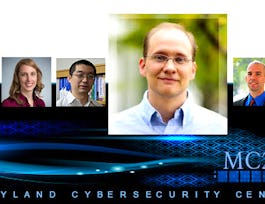Cryptography is an indispensable tool for protecting information in computer systems. In this course you will learn the inner workings of cryptographic systems and how to correctly use them in real-world applications. The course begins with a detailed discussion of how two parties who have a shared secret key can communicate securely when a powerful adversary eavesdrops and tampers with traffic. We will examine many deployed protocols and analyze mistakes in existing systems. The second half of the course discusses public-key techniques that let two parties generate a shared secret key. Throughout the course participants will be exposed to many exciting open problems in the field and work on fun (optional) programming projects. In a second course (Crypto II) we will cover more advanced cryptographic tasks such as zero-knowledge, privacy mechanisms, and other forms of encryption.


Cryptography I
Taught in English
Some content may not be translated
453,987 already enrolled
(4,231 reviews)
Details to know

Add to your LinkedIn profile
13 quizzes
See how employees at top companies are mastering in-demand skills


Earn a career certificate
Add this credential to your LinkedIn profile, resume, or CV
Share it on social media and in your performance review

There are 7 modules in this course
Week 1. This week's topic is an overview of what cryptography is about as well as our first example ciphers. You will learn about pseudo-randomness and how to use it for encryption. We will also look at a few basic definitions of secure encryption.
What's included
12 videos2 readings2 quizzes
Week 2. We introduce a new primitive called a block cipher that will let us build more powerful forms of encryption. We will look at a few classic block-cipher constructions (AES and 3DES) and see how to use them for encryption. Block ciphers are the work horse of cryptography and have many applications. Next week we will see how to use block ciphers to provide data integrity. The optional programming assignment this week asks students to build an encryption/decryption system using AES.
What's included
11 videos2 quizzes
Week 3. This week's topic is data integrity. We will discuss a number of classic constructions for MAC systems that are used to ensure data integrity. For now we only discuss how to prevent modification of non-secret data. Next week we will come back to encryption and show how to provide both confidentiality and integrity. This week's programming project shows how to authenticate large video files. Even if you don't do the project, please read the project description --- it teaches an important concept called a hash chain.
What's included
11 videos2 quizzes
Week 4. This week's topic is authenticated encryption: encryption methods that ensure both confidentiality and integrity. We will also discuss a few odds and ends such as how to search on encrypted data. This is our last week studying symmetric encryption. Next week we start with key management and public-key cryptography. As usual there is also an extra credit programming project. This week's project involves a bit of networking to experiment with a chosen ciphertext attack on a toy web site.
What's included
12 videos2 quizzes
Week 5. This week's topic is basic key exchange: how to setup a secret key between two parties. For now we only consider protocols secure against eavesdropping. This question motivates the main concepts of public key cryptography, but before we build public-key systems we need to take a brief detour and cover a few basic concepts from computational number theory. We will start with algorithms dating back to antiquity (Euclid) and work our way up to Fermat, Euler, and Legendre. We will also mention in passing a few useful concepts from 20th century math. Next week we will put our hard work from this week to good use and construct several public key encryption systems.
What's included
9 videos1 reading2 quizzes
Week 6. This week's topic is public key encryption: how to encrypt using a public key and decrypt using a secret key. Public key encryption is used for key management in encrypted file systems, in encrypted messaging systems, and for many other tasks. The videos cover two families of public key encryption systems: one based on trapdoor functions (RSA in particular) and the other based on the Diffie-Hellman protocol. We construct systems that are secure against tampering, also known as chosen ciphertext security (CCA security). There has been a ton of research on CCA security over the past decade and given the allotted time we can only summarize the main results from the last few years. The lectures contain suggestions for further readings for those interested in learning more about CCA secure public-key systems. The problem set this week involves a bit more math than usual, but should expand your understanding of public-key encryption. Please don't be shy about posting questions in the forum. This is the last week of this Crypto I course. I hope everyone learned a lot and enjoyed the material. Crypto is a beautiful topic with lots of open problems and room for further research. I look forward to seeing you in Crypto II where we will cover additional core topics and a few more advanced topics.
What's included
11 videos2 quizzes
Congratulations! We are at the end of the course. This module contains only the final exam which covers the entire course. I hope everyone learned a lot during these 6 weeks. Good luck on the final exam and I look forward to seeing you at a future course!
What's included
1 quiz
Instructor

Offered by
Recommended if you're interested in Computer Security and Networks

University of Maryland, College Park

University of London

University of Colorado System

University of Leeds
Why people choose Coursera for their career




Learner reviews
Showing 3 of 4231
4,231 reviews
- 5 stars
85.05%
- 4 stars
12.05%
- 3 stars
1.65%
- 2 stars
0.52%
- 1 star
0.70%
New to Computer Security and Networks? Start here.

Open new doors with Coursera Plus
Unlimited access to 7,000+ world-class courses, hands-on projects, and job-ready certificate programs - all included in your subscription
Advance your career with an online degree
Earn a degree from world-class universities - 100% online
Join over 3,400 global companies that choose Coursera for Business
Upskill your employees to excel in the digital economy
Frequently asked questions
Access to lectures and assignments depends on your type of enrollment. If you take a course in audit mode, you will be able to see most course materials for free. To access graded assignments and to earn a Certificate, you will need to purchase the Certificate experience, during or after your audit. If you don't see the audit option:
The course may not offer an audit option. You can try a Free Trial instead, or apply for Financial Aid.
The course may offer 'Full Course, No Certificate' instead. This option lets you see all course materials, submit required assessments, and get a final grade. This also means that you will not be able to purchase a Certificate experience.
When you purchase a Certificate you get access to all course materials, including graded assignments. Upon completing the course, your electronic Certificate will be added to your Accomplishments page - from there, you can print your Certificate or add it to your LinkedIn profile. If you only want to read and view the course content, you can audit the course for free.
You will be eligible for a full refund until two weeks after your payment date, or (for courses that have just launched) until two weeks after the first session of the course begins, whichever is later. You cannot receive a refund once you’ve earned a Course Certificate, even if you complete the course within the two-week refund period. See our full refund policy.

